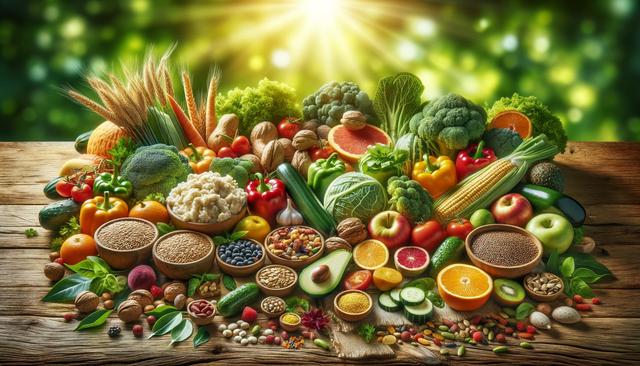Exploring Plant-Based Diets: Nutritional Benefits and Recipe Ideas
Plant-based diets are gaining popularity for their health benefits and delicious, diverse recipes.

Understanding Plant-Based Diets
Plant-based diets emphasize the consumption of foods derived primarily from plants, including fruits, vegetables, nuts, seeds, oils, whole grains, legumes, and beans. While these diets can include small amounts of animal products, many adherents choose to avoid them altogether. The focus is not on eliminating food groups but rather on prioritizing nutrient-rich plant foods. This approach is not only about what to exclude but more importantly, what to include to enhance health and sustainability.
One of the driving forces behind the plant-based diet trend is its potential health benefits. Numerous studies have linked plant-based diets to a lower risk of heart disease, hypertension, diabetes, and certain cancers. This is largely attributed to the high intake of fiber, vitamins, and antioxidants found in plant foods. Additionally, plant-based diets are typically lower in saturated fats and cholesterol, which contribute to heart health.
Nutritional Benefits of a Plant-Based Diet
Adopting a plant-based diet offers a variety of nutritional benefits. First and foremost, these diets are rich in fiber, which aids in digestion and can help maintain a healthy weight. Fiber also plays a critical role in lowering cholesterol levels and stabilizing blood sugar. Furthermore, plant-based diets are abundant in essential vitamins and minerals such as Vitamin C, Vitamin E, magnesium, and potassium.
Another important aspect of plant-based diets is their abundance of phytonutrients. These are natural compounds found in plants that have antioxidant and anti-inflammatory properties. They help protect against oxidative stress and inflammation, which are linked to various chronic diseases. Additionally, plant-based diets typically provide sufficient amounts of plant protein, which is essential for muscle repair and overall body function.
Practical Tips for Transitioning to a Plant-Based Diet
Transitioning to a plant-based diet can be both exciting and challenging. Here are some practical tips to ease the process:
- Start gradually by incorporating more vegetables and fruits into your meals.
- Experiment with plant-based proteins such as lentils, chickpeas, and tofu to replace meat in some dishes.
- Plan your meals to ensure you are getting a balanced intake of nutrients.
- Explore new recipes and cuisines to keep your meals interesting and flavorful.
- Join a community or find a support group for motivation and recipe sharing.
It’s important to ensure that your diet remains balanced and varied to meet all your nutritional needs. Consulting with a nutritionist can provide personalized guidance tailored to your lifestyle and health goals.
Delicious Plant-Based Recipe Ideas
One of the joys of a plant-based diet is the opportunity to explore a wide range of flavors and textures. Here are a few recipe ideas to get you started:
- Chickpea Salad: Combine chickpeas with diced cucumbers, tomatoes, red onion, and a lemon-tahini dressing for a refreshing meal.
- Stir-Fried Tofu and Vegetables: Sauté tofu with your choice of seasonal vegetables and a splash of soy sauce for a savory dish.
- Quinoa and Black Bean Bowl: Mix cooked quinoa with black beans, corn, avocado, and fresh lime juice for a nutritious bowl.
- Sweet Potato and Lentil Curry: Simmer sweet potatoes and lentils with coconut milk and curry spices for a comforting stew.
These recipes not only satisfy the palate but also provide a wealth of nutrients beneficial to health.
Conclusion: Embrace the Plant-Based Lifestyle
Adopting a plant-based diet can bring numerous benefits to your health and the environment. By focusing on whole, nutrient-dense foods, you can enjoy improved well-being while reducing your environmental footprint. The variety of available recipes ensures that you can enjoy delicious meals without feeling deprived. Whether you choose to go fully plant-based or simply increase the proportion of plant foods in your diet, the key is to enjoy the journey and discover what works best for you.